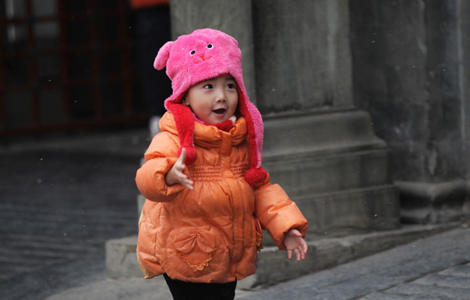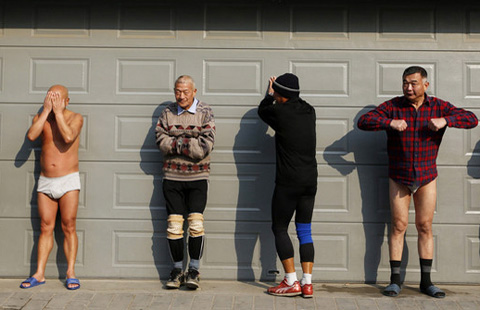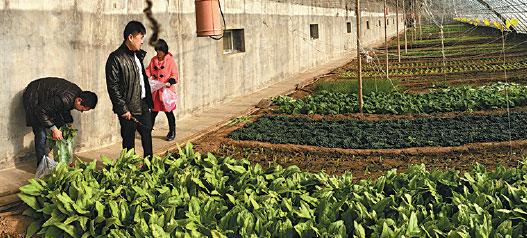Vegetables tainted by multiple pesticides
Updated: 2015-01-16 07:11
By Wang Xiaodong(China Daily USA)
|
||||||||
Pesticide residue on fresh vegetables sold in Beijing's markets is a big problem, according to a survey covering three of China's biggest cities.
And it's not just one pesticide, but many.
About 40 percent of the 53 vegetable samples collected from markets in Beijing and neighboring areas, which supply vegetables to Beijing, contained five or more kinds of pesticide residue, according to the survey. Results of the survey were released by Greenpeace, the international environmental protection organization, earlier this week.
Some common vegetables - tomatoes, cabbage and cucumbers - were most polluted, and 16 types of pesticides were detected in one variety of lettuce sold at a market in Beijing, the report said.
The survey, conducted by Greenpeace in the second half of last year, sampled 133 vegetables from markets in Beijing, Shanghai and Guangzhou, and from other areas that supply vegetables to the three cities. It covered 26 types of common vegetables used in Chinese dishes.
All the samples were sent to certified independent labs for testing, the report said.
Greenpeace used GPS devices to trace the path of vegetables from the fields to markets in the three cities, the report said.
The results showed that vegetables sold in Shanghai contain much less pesticide residue than those sold in Beijing and Guangzhou.
Only one sample of the 42 taken for Shanghai contained residue that exceeded national standards, according to the report, while 30 percent of 38 samples collected in Guangzhou and its neighboring areas contained residues exceeding national limits.
"We found that 70 percent of vegetables sold in the markets in Beijing come from other areas, such as Shandong and Hebei provinces, which lack strict supervision to ensure safety," said Wang Jing, a senior campaigner for food and agriculture at Greenpeace East Asia. This caused difficulties for authorities in Beijing for effective supervision, she said.
Compared with Beijing, Shanghai has done better in supervision and in promoting the ecologically friendly production of vegetables, she said.
"We found that the authorities in Shanghai have detailed measures to encourage farmers to carry out green farming, such as providing them with subsidies," she said.
Unlike Beijing and Guangzhou, Shanghai has a complete system to trace the flow of vegetables from the fields to the markets, she said.
Wang said vegetables with excess levels of pesticide residue can create health risks for consumers.
"Washing vegetables with water can reduce residues, but cannot eliminate them completely, as many pesticides can be absorbed into the vegetables," she said.
To avoid potential risks, Wang suggests people buy vegetables from certified organic producers or farmers who rely on traditional way of farming.
Besides, it is better to eat seasonal vegetables as they are less likely to be tainted with pesticides, she said.
Jiang Gaoming, a researcher at the Institute of Botany of the Chinese Academy of Sciences, said that governments need to play a stronger supervisory role to reduce problems such as the excessive use of pesticides and the use of banned pesticides.
"The best solution to pesticide residue is to develop green farming, so that less or no pesticide will be used," he said.
"Experiments have shown that pests can be controlled without using pesticides."
wangxiaodong@chinadaily.com.cn
|
Tourists pick vegetables in a garden in Beijing's Daxing district in December. Li Xin / Xinhua |
(China Daily USA 01/16/2015 page3)

 Two Chinese-American reps sworn in
Two Chinese-American reps sworn in
 Mental illness no handicap to Nanjing artists
Mental illness no handicap to Nanjing artists
 Kashgar's diversity of cultures
Kashgar's diversity of cultures
 Best wedding snaps in 2014
Best wedding snaps in 2014
 Fancy sportscars premiere at Detroit auto show
Fancy sportscars premiere at Detroit auto show
 Looking hot in the cold
Looking hot in the cold
 Beijing sees first winter snow amid heavy smog
Beijing sees first winter snow amid heavy smog
 Elderly swimmers see health benefits in freezing water
Elderly swimmers see health benefits in freezing water
Most Viewed
Editor's Picks

|

|

|

|

|

|
Today's Top News
US official lauds fight by China vs. graft
China plays mediator in Afghanistan
Chinese tourists boost travel to Los Angeles
Pursuing General Tso and his chicken
Videos show attack on USC student
Two Chinese-American reps sworn in
E-commerce firm Wowo to seek $40m in US IPO
Lunar New Year to boost gold sales
US Weekly

|

|








